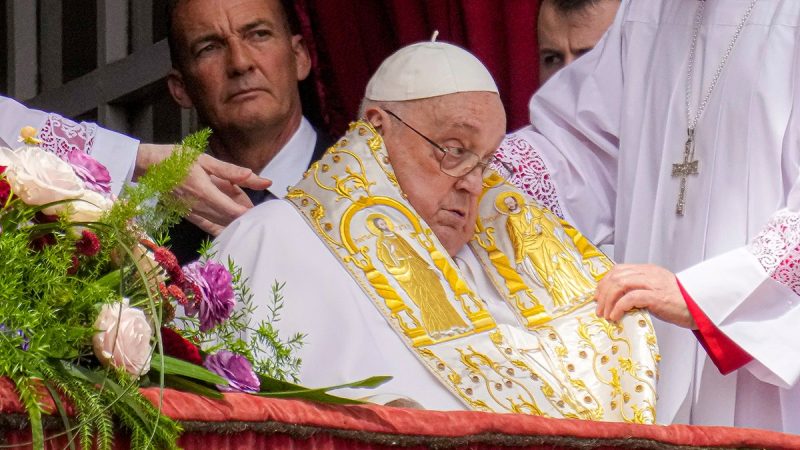
There have been 266 papal leaders of the Catholic Church since Jesus Christ’s death in the AD 30s through Pope Francis – Jorge Mario Bergoglio – who died on Easter Monday at 88.
The most prominent pope is considered to be St. Peter, the first holder of the title.
Christ had appointed him the inaugural Bishop of Rome, and the papal church – St. Peter’s Basilica in Vatican City – is named in his honor.
St. Peter’s writings to persecuted people in the Asia Minor region are also chronicled in the New Testament’s epistles.
Peter reportedly died around 64 and was succeeded by Pope Linus.
In the present day, there is wide agreement across the Catholic world that one of the most recent popes, John Paul II, deserves to be in consideration as the most influential pontiff.
John Paul II was also the first non-Italian pope since Pope Adrian in the 1500s. Born Karol Wojtyla in Poland, John Paul’s lengthy three decades in the Vatican were marked with very prominent situations for the Catholic Church.
John Paul II oversaw the movement into the digital age, but he continued to be a prolific writer.
He revised the Canon Laws for the church, wrote more than a dozen encyclicals, apostolic exhortations, nearly 50 apostolic letters and several books, as chronicled by Father William Saunders in his cataloging of ‘great’ popes.
While Pope John Paul II has not officially been dubbed John Paul the Great, there is wide consensus that one day he will be.
John Paul notably held a Mass praying for God’s forgiveness for the past sins of the Catholic Church itself and made more than 100 state visits, which included engaging with non-Christians, Saunders wrote in Catholic Answers.
One of those visits featured the pope offering Mass to 80,000 people at Yankees Stadium in The Bronx, New York in 1979.
Only a few popes – Leo I, Gregory I and Nicholas I – have been given the moniker ‘the great.’
In the 400s, Pope Leo met with Attila the Hun and prevented a siege of Rome, though the Vandals took it over later.
Pope Gregory I was the Catholic leader who in the late 500s stylized ‘Gregorian Chant’ – a tradition still present in many Catholic churches today.
Born wealthy, Gregory I later gave up his riches and moved into a monastery and aided the poor.
Gregory was considered the treasurer of Rome, according to the Encyclopedia Britannica, which chronicles his efforts to prevent sieges from groups like the Lombards.
He also repaired Roman infrastructure, sought détente with the Lombards and Gauls and enforced government laws he personally disagreed with and protested against – explaining that he did his duty to obey [Emperor Maurice] while not ‘restrain[ing] what ought to be said on God’s behalf.’
Pope Nicholas became pontiff in the mid 800s. He notably urged against the attempt by a king to divorce his wife and marry another woman. He also believed the Holy See was the head of the Catholic Church and urged the ‘supremacy of Rome,’ according to the Encyclopedia Britannica.
Other popes may not have been monikered ‘the great’ but have had lasting impact on the world and society.
One such pontiff was Pope Gregory XIII.
Purported miscalculations in the Julian calendar spurred Gregory XIII to decree a new calendar in 1582 – as the spring equinox had fallen back to early March over a span of 1,400 years.
On Oct. 4, 1582, Gregory XIII ordered the next day be considered Oct. 15, not Oct. 5 – therefore fixing the lunar discrepancy. By the end of the 16th century, most Western lands had come around to following the new ‘Gregorian calendar.’
Another historically influential pontiff was Pope Innocent III. Around 1200, Innocent III launched several ‘Crusades’ against Muslim-held lands in what is now France, Spain and Portugal, as well as an effort to take back the historic Holy Land near today’s Israel and Jordan.
He also extended his power into personal affairs, ordering King Philip of France to return to his separated wife.
The most recent pope, Francis, was considered influential in that he was one of few to delve more into the political sphere than past pontiffs.
In 2015, Francis published the first papal encyclical to be focused on the environment: Laudato Si.
Among its repercussions, it helped foreshadow that year’s U.N. Climate Change Conference in Paris, which led to a global warming treaty between 196 countries, according to Vatican News.
He was also known for his critiques on Western market capitalism, once calling the ‘unfettered pursuit of money’ the ‘dung of the devil’ during a speech.




